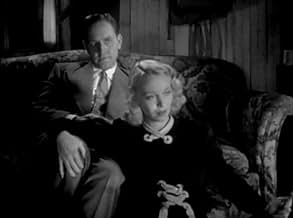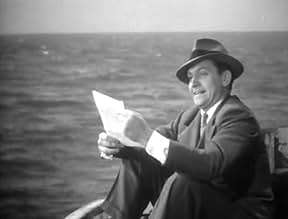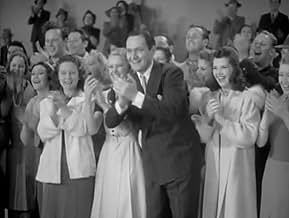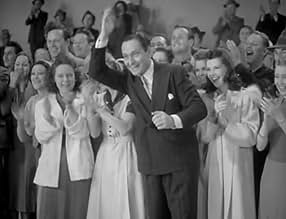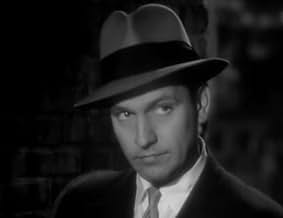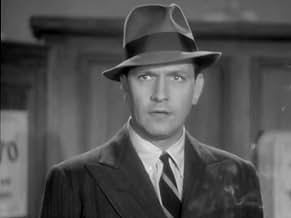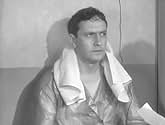अपनी भाषा में प्लॉट जोड़ेंA young heiress runs away from her overprotective grandfather. Penniless on the streets of New York, she manages to find employment, but a reporter knows her true identity.A young heiress runs away from her overprotective grandfather. Penniless on the streets of New York, she manages to find employment, but a reporter knows her true identity.A young heiress runs away from her overprotective grandfather. Penniless on the streets of New York, she manages to find employment, but a reporter knows her true identity.
- निर्देशक
- लेखक
- स्टार
- 1 ऑस्कर के लिए नामांकित
- कुल 1 नामांकन
Syd Saylor
- Robinson
- (as Sid Saylor)
Ernie Adams
- Cafe Counterman
- (बिना क्रेडिट के)
Ralph Brooks
- Cafe Customer
- (बिना क्रेडिट के)
Horace G. Brown
- Ice Skater
- (बिना क्रेडिट के)
George Burton
- Drayman
- (बिना क्रेडिट के)
फ़ीचर्ड समीक्षाएं
...It doesn't entirely work, unfortunately. Fredric March is excellent, as always. What a fine and versatile actor! And Virginia Bruce is winning, as she always was. She plays an heiress, he a newspaper reporter sent to get a story about her. (This aspect presages the Bette Davis movie "Golden Arrows.") Eugene Palette, always a treat, plays his editor.
Bruce is not an ideal screwball heroine, unfortunately. Her pale, wistful beauty doesn't really lend itself to the genre, though she is dine in the movie. Patsy Kelly is hilarious as her pal: Bruce has sailed to Manhattan in her yacht while granddaddy is away. She finds herself in the City with no money. At a diner (kind of an Automat but not really) she and Kelly scam some food. Kelly picks her up! "If you don't have anywhere else to go, you can spend the night at my place." Kelly's ostensible romantic interest is Alan Mowbry, a neighbor who is studying to become a chiropractor by mail. What a couple they make! Back at the store where Kelly works, which Grandpa owns, we see Kelly demonstrating a device called "Vibrato." It's a kind of Sapphic intimation of the Vega-Meta-Vitamin sequence decades later from "I Love Lucy." The movie has a sterling supporting cast, which also includes Nancy Carroll, delicious as a jealous, catty fellow saleswoman.
It also, unfortunately, has afar too lengthy and pointless scene with Bruce and march at a skating rink. Why it was allowed to go on so long is a mystery. (There is a similar scene in one of Irene Dunne's lesser comedies -- "Joy of Living," I think.) The movie begins in a stylish, chic manner but it loses its way. It could have been in the top tier but as it is it's still fun.
Bruce is not an ideal screwball heroine, unfortunately. Her pale, wistful beauty doesn't really lend itself to the genre, though she is dine in the movie. Patsy Kelly is hilarious as her pal: Bruce has sailed to Manhattan in her yacht while granddaddy is away. She finds herself in the City with no money. At a diner (kind of an Automat but not really) she and Kelly scam some food. Kelly picks her up! "If you don't have anywhere else to go, you can spend the night at my place." Kelly's ostensible romantic interest is Alan Mowbry, a neighbor who is studying to become a chiropractor by mail. What a couple they make! Back at the store where Kelly works, which Grandpa owns, we see Kelly demonstrating a device called "Vibrato." It's a kind of Sapphic intimation of the Vega-Meta-Vitamin sequence decades later from "I Love Lucy." The movie has a sterling supporting cast, which also includes Nancy Carroll, delicious as a jealous, catty fellow saleswoman.
It also, unfortunately, has afar too lengthy and pointless scene with Bruce and march at a skating rink. Why it was allowed to go on so long is a mystery. (There is a similar scene in one of Irene Dunne's lesser comedies -- "Joy of Living," I think.) The movie begins in a stylish, chic manner but it loses its way. It could have been in the top tier but as it is it's still fun.
Okay, so this is a copy of It Happened One Night. Big deal. There's actually a fair amount in it that is different. The basic elements are the same: Girl runs away from dad/grandfather and dodges the detectives but comes face-to-face with a reporter hiding his identity from her.
I would say that the primary difference between films is the attitudes of the leading men. Clark is essentially blackmailing Claudette in IHON, while in this film, Fredric doesn't seem to have any intention of publicising Virginia - he doesn't want to write the story in the first place, keeps delaying the finish of his story, and finally he rips it up and refuses to do it at all. In TGMH, there is also a strange but amusing supporting actress who works in the same store as Virginia does. Oscar Shapely of IHON is not her equivalent, though amusing in his own way, believe you me.
It Happened One Night is definitely the more solid of the two movies, but There Goes My Heart is fun to watch and should be more actively viewed than it is, instead of being condemned by a majority that probably hasn't seen it, but bases their opinions on the negative reviews of others. I myself was sceptical - I just watched it prepared to react whatever way the movie led me, and I have to say that I did like it and would definitely see it again.
I would say that the primary difference between films is the attitudes of the leading men. Clark is essentially blackmailing Claudette in IHON, while in this film, Fredric doesn't seem to have any intention of publicising Virginia - he doesn't want to write the story in the first place, keeps delaying the finish of his story, and finally he rips it up and refuses to do it at all. In TGMH, there is also a strange but amusing supporting actress who works in the same store as Virginia does. Oscar Shapely of IHON is not her equivalent, though amusing in his own way, believe you me.
It Happened One Night is definitely the more solid of the two movies, but There Goes My Heart is fun to watch and should be more actively viewed than it is, instead of being condemned by a majority that probably hasn't seen it, but bases their opinions on the negative reviews of others. I myself was sceptical - I just watched it prepared to react whatever way the movie led me, and I have to say that I did like it and would definitely see it again.
HEART is an attempt at a screwball comedy that fails for a couple of reasons: a plot that gets too entangled, to the point of incredulity, and a lead actress who may look a little like Carol Lombard, but clearly isn't. Virginia Bruce is the female in question as a runaway heiress who ends up working incognito in her grandfather's department store, clearly meant to resemble Macy's. The thin-faced Bruce is a bit too wistful for the role, unfortunately. The role really could have used Lombard -- or Thelma Todd or Irene Dunne or Katherine Hepburn or Claudette Colbert, or even one of the Bennett sisters. Frederic March is, as always, note-perfect as a cynical reporter on Bruce's trail who -- what else? -- ends up falling for her. There is a stunt-filled ice skating sequence that takes up a bit too much time, compounded by a very rushed ending that leaves major plot strings untied. The wonderful Eugene Palette is on hand as March's blustery editor, and wisecracking Patsy Kelly is in fine form as a downtrodden store clerk who takes Bruce in. This may be no BRINGING UP BABY or NOTHING SACRED or IT HAPPENED ONE NIGHT, but it is fun to watch March, Kelly and Palette in action. And it is also viewable in its historic context, surrounded as it was by several masterpieces of the genre.
The part of the runaway heiress would have been right up Nancy Carroll's alley. Likewise, I think Virginia Bruce might have been more convincing in Ms. Carroll's part as a scheming shop girl that puts on airs. Ms. Bruce just didn't have the same air of mischief that Nancy Carroll did that could have really added a needed touch of spice to this movie.
Yes, there are similarities to "It Happened One Night" as everyone else has mentioned. There's a runaway heiress, a reporter in the know (Frederic March as Bill Spencer) that winds up falling for said heiress, even the heiress running away from the overbearing elder of the family - in this case her grandfather. However, everything else is pretty unique. In IHON Claudette Colbert's character was forced to live like an ordinary Depression era American in order to blend in with the crowd enough that she could get to her fiancée undetected by her father. Here, Joan Butterfield (Virginia Bruce) has an end goal of being one of those average Americans and standing on her own two feet.
The delight is in the details here - There's Patsy Kelly as Joan's friend, shop girl Peggy O'Brien, demonstrating a vibrating weight loss machine at work and when the electricity goes out in her small apartment, plugging into the flashing sign outside her window. Of course now it takes twice as long to cook dinner and all of her lamps are flashing on and off. Ms. Kelly is practically the third lead here, and her comic performance as Joan's mentor at living the working class life is pitch perfect. She's noisy and assertive as usual, but she doesn't go overboard. Alan Mowbrey as Peggy's boyfriend, a 40-something chiropractic student living across the hall from Peggy that works nights, is a great comic touch. The two humorously meet on the stairwell each evening for a passionate kiss, he as he heads off to work and she as she heads home from work. Not to be overlooked is Eugene Palette as Bill Spencer's perpetually agitated editor. He and March inflict every comic verbal insult possible on one another yet they just can't seem to live without one another - much like Daffy Duck and Bugs Bunny. In fact, I found that Palette and March had much more chemistry together than did Frederic March and Virginia Bruce.
This is one film where the scenery along the way is much more interesting than the ultimate destination as I felt the conclusion landed with a thud and seemed rather forced. Still I'd recommend it just for all the goofy stuff that you could only find in Hal Roach productions in the 30's. Ultimately it's a satisfying feel-good little film.
Yes, there are similarities to "It Happened One Night" as everyone else has mentioned. There's a runaway heiress, a reporter in the know (Frederic March as Bill Spencer) that winds up falling for said heiress, even the heiress running away from the overbearing elder of the family - in this case her grandfather. However, everything else is pretty unique. In IHON Claudette Colbert's character was forced to live like an ordinary Depression era American in order to blend in with the crowd enough that she could get to her fiancée undetected by her father. Here, Joan Butterfield (Virginia Bruce) has an end goal of being one of those average Americans and standing on her own two feet.
The delight is in the details here - There's Patsy Kelly as Joan's friend, shop girl Peggy O'Brien, demonstrating a vibrating weight loss machine at work and when the electricity goes out in her small apartment, plugging into the flashing sign outside her window. Of course now it takes twice as long to cook dinner and all of her lamps are flashing on and off. Ms. Kelly is practically the third lead here, and her comic performance as Joan's mentor at living the working class life is pitch perfect. She's noisy and assertive as usual, but she doesn't go overboard. Alan Mowbrey as Peggy's boyfriend, a 40-something chiropractic student living across the hall from Peggy that works nights, is a great comic touch. The two humorously meet on the stairwell each evening for a passionate kiss, he as he heads off to work and she as she heads home from work. Not to be overlooked is Eugene Palette as Bill Spencer's perpetually agitated editor. He and March inflict every comic verbal insult possible on one another yet they just can't seem to live without one another - much like Daffy Duck and Bugs Bunny. In fact, I found that Palette and March had much more chemistry together than did Frederic March and Virginia Bruce.
This is one film where the scenery along the way is much more interesting than the ultimate destination as I felt the conclusion landed with a thud and seemed rather forced. Still I'd recommend it just for all the goofy stuff that you could only find in Hal Roach productions in the 30's. Ultimately it's a satisfying feel-good little film.
Broadly played and directed semi-screwball outing has charming Fredric March cast as a newspaper reporter assigned to locate a wealthy, beautiful young heiress, who has ditched her fancy surroundings for a regular life in New York City. Grounded, natural Virgina Bruce was a good choice for the rich kid, who ends up working in the department store her family owns, and Patsy Kelly is wonderfully brash as the salesgirl who unknowingly takes her in. The supporting characters are made up of wacky, genial crazies, and the actors have been encouraged to play them to the hilt, resulting in some overcooked comedy which may strike one as either funny or far too silly. There are some classic bits: the ice-skating sequence where March and Bruce end up in a game of Musical Chairs, an unbilled Marjorie Main as a plain-spoken customer in the store, and Kelly's solution to the power going out just before a fancy dinner in her apartment. The script, by Jack Jevne and Eddie Moran (from a story by Ed Sullivan!), was criticized at the time for being too close to "It Happened One Night", but it's actually far less ambitious. The plot set-up is one-half merry mix-up and the other half romantic nuttiness, and many of the lines have a punch-drunk giddiness which is very sweet. **1/2 from ****
क्या आपको पता है
- ट्रिवियाAccording to a New York Times article on 16 October 1938, the Citizen's Chiropractic Committee of New York State sued the film producers, authors and Alan Mowbray for $100,000 claiming damages to the profession. One doctor was very upset that the film implied it was possible to go through a chiropractic school through a correspondence course. The outcome of the suit is not known.
- भाव
Peggy O'Brien: Just think, someday i'll be Mrs. Doctor Pennypepper E. Pennypepper... then I'll find out what the E. stands for!
- क्रेज़ी क्रेडिटThe opening credits are shown as if viewed through a ship's porthole with waves erasing each set of credits.
- साउंडट्रैकA Life on the Ocean Wave
(1838) (uncredited)
Music by Henry Russell
Lyrics by Epes Sargent
Sung a cappella by Fredric March
टॉप पसंद
रेटिंग देने के लिए साइन-इन करें और वैयक्तिकृत सुझावों के लिए वॉचलिस्ट करें
विवरण
- रिलीज़ की तारीख़
- कंट्री ऑफ़ ओरिजिन
- भाषा
- इस रूप में भी जाना जाता है
- En flicka överbord
- फ़िल्माने की जगहें
- उत्पादन कंपनी
- IMDbPro पर और कंपनी क्रेडिट देखें
- चलने की अवधि1 घंटा 23 मिनट
- रंग
- पक्ष अनुपात
- 1.37 : 1
इस पेज में योगदान दें
किसी बदलाव का सुझाव दें या अनुपलब्ध कॉन्टेंट जोड़ें


